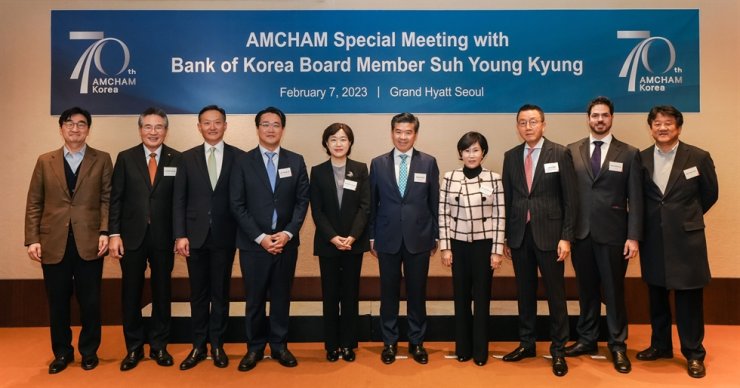
 >
>
>
>
2023.02.07
Korea's monetary policymaker downplays concerns over growing interest rate gap between Korea, US

By Park Jae-hyuk, The Korea Times - A member of the Bank of Korea (BOK) Monetary Policy Board advised U.S. businesspeople here not to worry about the widening policy rate gap between the two countries, asking them to increase investments in Asia's fourth largest economy. The monetary policymaker's advice hints that Korea's central bank may not raise its key rate further this year, even if the U.S. Federal Reserve carries out a couple of additional rate hikes.
During Tuesday's meeting with
members of the American Chamber of Commerce in Korea (AMCHAM), Suh Young-kyung
emphasized Korea's capability to endure the difference in interest rates, in
response to concerns about the Fed's additional rate hikes this year to cool
down the labor market and slow inflation.
"More than 60 percent of
foreign investments in Korean bonds are long-term investments based on
fundamental factors, so they are not sensitive to the rate difference,"
she said. "Overseas investments by Koreans go largely into stocks rather
than bonds, so they are also less influenced by the rate difference." Suh
added that the rate gap will not weaken the Korean won against the U.S. dollar,
as investors do not expect inflation to be higher in Korea than in the U.S.
Although she declined to
comment on the expectation that the BOK will freeze the key rate this month,
she said that members of the Monetary Policy Board have already assessed the
current interest rate as high enough. "We will maintain tightening measures
for a considerable period of time," she said.
The former BOK deputy governor
also talked about the central bank's plans to prevent any side effects caused
by the government's plan to open up the foreign currency market.
"The International
Monetary Fund (IMF) has also recommended that emerging countries carry out
policies to stabilize each of their foreign exchange markets, considering the
necessity of their monetary policies being independent of the U.S.," Suh
said. "In collaboration with the government, the BOK will continue its
efforts to stabilize the foreign currency market."
From that standpoint, she asked
foreign companies here to be more aggressive in their investments in Korea,
especially advising them to cope with climate change and the fragmentation of
the global supply chain.
In response to a question about
when the chip industry will bottom out, Suh answered that the central bank
expects the market to bounce back during the second half of this year,
considering the semiconductor cycle.
"While there are
uncertainties and challenges in the global economy this year, we remain
optimistic that the Korean government, with its strong commitment to delivering
economic reforms, will be able to navigate the economic landscape wisely,"
AMCHAM Chairman James Kim said.
Source: www.koreatimes.co.kr/www/tech/2023/02/129_344986.html